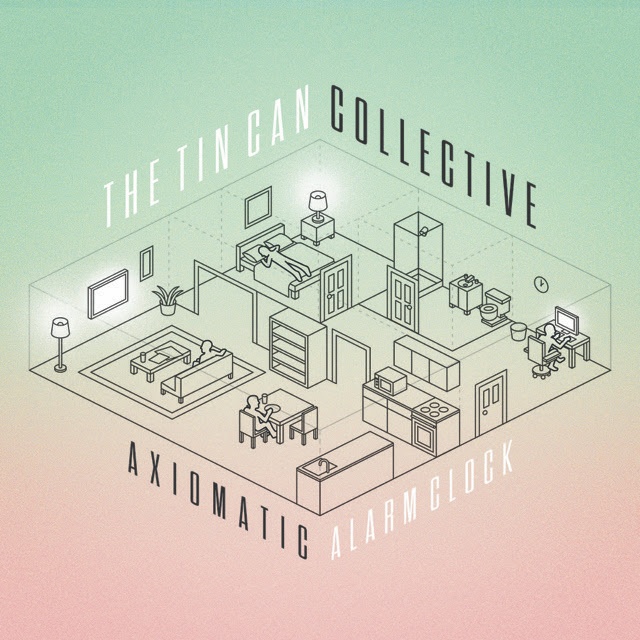Don’t press snooze on Tin Can Collective’s “Axiomatic Alarm Clock”

Image courtesy of Wolfvibes Publicity | Design credit: Paul Motisi
There’s something about the particular way in which Long Island, NY quintet, Tin Can Collective, repeatedly leaves listeners stylistically stumped and-or cramming multiple musical labels under one umbrella when talking about the band, that feels not nearly as aimless as it looks on paper. This sentime rings especially true for the group’s newest full length, Axiomatic Alarm Clock (independent, 2021).

Image courtesy of Wolfvibes Publicity | Photo credit: Jon Greco
Tin Can Collective is:
Jess Warren (Guitar, Vocals
)
Nick Femister (Guitar)
Ken Russo (Bass)
John Warren (Guitar, Baritone, Keyboard, Programming, Banjo, Ukulele, Vocals)
Brian Kish (Drums)
In listening to this group’s latest album, a potpourri of tonal qualities, performative approaches, and compositional structures jump out with a clear and decisive enough vibrance to seemingly justify a person’s inclination to rattle off consecutive mentions of indie rock, emo, garage punk, folk rock, and even a touch of shoegaze. Densely packed layers of thick-toned guitar chords open “Monday Monday” with both a tonal and rhythmic bluntness befitting of a song named for the beginning of the work week. A similar, and even somewhat more severe, rhythmic plunking shapes the foundation of “All Alone in the Apartment.” John Warren’s vocals are kept not only to a melodic minimum but also delivered with a sense of dejected jadedness that conveys a definitely emo mindset while also retaining an aspect of relatable humanity as opposed to imparting a more dramatic and deliberate caricature style of emo singing that disconnects from real life behavior or means of expression.
Though it’s certainly not common to see people break out into song à la Broadway musical when needing to express their feelings, it’s not entirely out of the realm of possibility to imagine a rock band guitarist, alone in their apartment, attempting to pass the time with their instrument while reclined on a worn-in couch and singing and strumming but doing both the least amount of serious drive possible. Think of the low point after a breakup, where the sadness lingers but in trying to play music the drive to really create something just isn’t there – what comes through is more of a rote coping mechanism at that point.
This sentiment isn’t a reflection or implication that John Warren and-or the rest of Tin Can Collective aren’t giving this song or any other song on Axiomatic Alarm Clock any genuine effort. Truthfully, the allusion to a similar emotionally realistic scenario is meant to emphasize just that: the realism in Tin Can Collective’s writing, playing, and performing styles. Axiomatic Alarm Clock doesn’t need to fear a slinging of too many style labels on its tracks because sonic labeling isn’t the most memorable marker of this record. It’s the album’s embodiment of real world experiences and real world feelings, in a “real people of the world” kind of way. Writing about real experiences isn’t new. However, writing about real experiences, as well as how those experiences inspire a person to feel, and then building songs via instrument choices, band arrangement, and tonal shaping that’s meant to reflect the way those non-musical feelings manifest for real people, is an immensely creative – not to mention incredibly nuanced – approach to songwriting.
It’s this skill and accompanying attribute – the embodying of real experiences and real feelings in an equally emotionally resonant and relatable manner – that seems to best summarize both the album and the band. Keeping this in mind, it suddenly makes a lot more sense as to why Axiomatic Alarm Clock, can turn its musical style on a dime and how the sonically diverse nature of the 15 track record manages to uphold a feeling of cohesion in spite of so much compositional variation. Between the prominent, angular, laser style keyboard cutting through and propelling the noisy choruses on “The Ballad of Jim Lahey,” and the surprising acoustic brevity of “Welcome to the Weekend,” (a song that, without seeing the run time, one might go into bracing for a hard, fast, and rowdy, banger meant to reflect the catharsis often brought on by the titular mentality or synonymous concepts like “TGIF,”) the tonal contrast couldn’t be bolder. Nonetheless, in the bigger picture of the musical and emotional statement, both fit under Tin Can Collective’s umbrella of reality-done-real.
Meanwhile, the latter song turns out not to be as surprising as it initially seems when considering the idea that for the band, the song’s context, dynamic intensity, and lyrics are intended to empathize with older adults facing unyielding responsibilities and expectations once the weekend rolls around, rather than the sweet respite of free and open time yet to be filled with any kind of revelry needed to feel good. Each scenario has its relatable demographic but it’s not as often one would expect to find a band capable of slinging the wittiest of words and the most gripping of arrangements opting to acknowledge the mundane and less enticing sides of self-sufficient adult life.
Welcome to the weekend
there’s so much to do
shopping and cleaning and paying the bills
I wanna close my eyes but stay awake
– Lyrics from “Welcome to the Weekend”
The experiential throughline and personification of middle-class U.S. suburban humanity on Axiomatic Alarm Clock is more than enough to fuel a whole discussion around performative expression and its impact on degree of relatability. Still, that’s not to say Tin Can Collective settled on charting a lo-fi course and then proceeded to put no extra effort or intent into creating an objectively well-recorded and smartly produced project. Even among sonic cacophony found on tracks like the guitar-raucous “Sunday” and the vocally-layered, melodically frenetic, “Where You Left You,” individual components across the album, like Brian Kishe’s snare and hi-hat hits on “End in the End,” the faint but noticeable fingerstyle acoustic guitar line on “Suburban Jungle,” and the very stripped down lead vocal on “All the Lights Went Out,” sound as though they were molded and slotted into the mix with the utmost care; the spirit of emotional connectivity remains uncompromised but Tin Can Collective’s ear for an objectively balanced mix is also left intact. The result is a clear support of artistic imperfection with a respect for the strength found in the nuances of focused recording and the potential of careful production.
No matter which way one comes at Axiomatic Alarm Clock, compositionally, conceptually, or stylistically, what each angle presents is the same: shrewd and creatively self-aware work which sounds fully comfortable in its own skin. Nothing about listening to this album projects a feeling of artistic uncertainty, even if some of the stories and sentiments sewn into each song are occasionally meant to reflect just the opposite.
Axiomatic Alarm Clock is available now.
Find it on Bandcamp, iTunes, and streaming on Spotify.
Keep connected with the Tin Can Collective through these social media platforms:
Facebook
Twitter (@tincancollec)
Instagram
YouTube
Bandcamp
Spotify

Leave a Reply